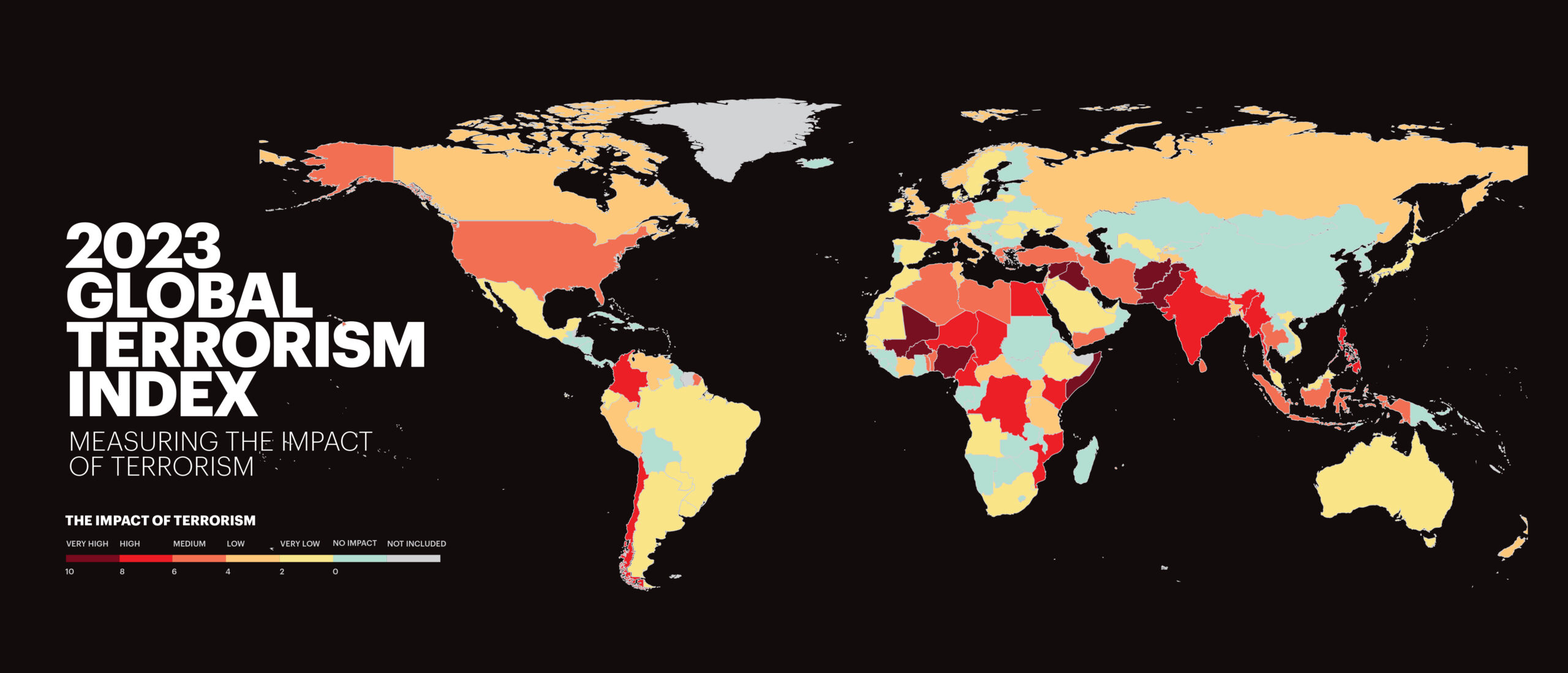What is terrorism? How does it occur? What are its consequences? The answers to these questions are not always straightforward. Terrorism is a complex issue with many different causes and consequences. In this article, we will explore the causes, consequences, and global impact of terrorism.
Editor's Notes: "Understanding Terrorism: Causes, Consequences, And Global Impact" have published today date and deeply discussed. Terrorism is a major threat to global security, and it is important to understand its causes and consequences in order to develop effective counterterrorism strategies.
In this article, we have done some analysis, digging information, made this Understanding Terrorism: Causes, Consequences, And Global Impact guide to help our target audience make the right decision.
Understanding the causes of terrorism is the key to preventing it. This guide will provide you with an overview of the causes, consequences, and global impact of terrorism. So stay tuned and be aware of such a global issue and threat. Stay connected with us.
| Causes of Terrorism | Consequences of Terrorism | Global Impact of Terrorism |
|---|---|---|
|
|
|

Where The Economic Impact Of Terrorism Is Strongest. Nigeria Is 3rd - Source www.nairaland.com
Understanding the consequences of terrorism is the key to mitigating its effects. This guide will help you to understand the consequences of terrorism and develop strategies to mitigate them.
The global impact of terrorism is significant. This guide will help you to understand the global impact of terrorism and develop strategies to address it.
FAQ
This FAQ section provides answers to frequently asked questions regarding the causes, consequences, and global impact of terrorism, a complex phenomenon with far-reaching implications for individuals and societies.

Terrorism: Meaning, Definition, Signs, Causes, Impact & Consequences - Source edukedar.com
Question 1: What are the primary causes of terrorism?
Terrorism is multifaceted and often stems from a combination of factors, including political, social, economic, and religious grievances. Key causes include:
- Political and ideological extremism
- Socioeconomic inequality and marginalization
- Historical conflicts and territorial disputes
- Religious fundamentalism and intolerance
Question 2: What are the consequences of terrorism?
Terrorism has severe consequences for individuals, communities, and nations:
- Loss of innocent lives and physical harm
- Psychological trauma and fear
- Damage to infrastructure and economies
- Erosion of trust and social cohesion
- Heightened security measures and restrictions
Question 3: How does terrorism impact the global community?
Terrorism is a transnational phenomenon that transcends borders:
- It undermines international cooperation and stability.
- It contributes to global insecurity and fear.
- It diverts resources from other pressing issues such as poverty, climate change, and public health.
Question 4: What can be done to prevent terrorism?
Countering terrorism requires a comprehensive approach:
- Addressing underlying causes such as poverty, inequality, and marginalization
- Promoting tolerance, understanding, and interfaith dialogue
- Strengthening international cooperation and intelligence sharing
- Enhancing security measures and border controls
- Engaging with communities at risk of radicalization
Question 5: How can victims of terrorism cope and recover?
Victims of terrorism face unique challenges:
- Trauma, grief, and loss
- Physical and psychological injuries
- Financial and social difficulties
- Access to support services such as counseling, medical care, and legal assistance is crucial for their recovery and well-being.
Question 6: What is the role of education in combating terrorism?
Education plays a vital role in preventing and countering terrorism:
- Promoting critical thinking, tolerance, and respect for diversity
- Challenging extremist ideologies and narratives
- Building resilience and equipping individuals with the skills to resist radicalization
Understanding the causes, consequences, and global impact of terrorism is essential for developing effective strategies to prevent and counter this complex threat.
Tips
Understanding terrorism and its complexities is crucial for governments, security agencies, and individuals alike. Several steps can be taken to enhance our understanding of this multifaceted issue:
Tip 1: Examine Root Causes:
Understanding the social, political, and economic factors that contribute to terrorism is essential. Poverty, lack of education, and discrimination are among the key drivers. Addressing these root causes can mitigate terrorist recruitment efforts.
Tip 2: Analyze Historical Context:
Terrorism is not a new phenomenon. Studying its history, evolution, and patterns can provide valuable insights into its motivations and strategies. By understanding the precedents, we can better anticipate and prevent future acts of terrorism.
Tip 3: Assess Political Impacts:
Terrorism significantly impacts political stability and governance. Governments must develop effective counterterrorism strategies while respecting human rights and the rule of law. Evaluating the political consequences of counterterrorism measures is crucial to avoid unintended consequences.
Tip 4: Consider Economic Implications:
Terrorism can disrupt economic activities, damage infrastructure, and hinder trade. Understanding the economic consequences, such as lost productivity and reduced investments, is vital for formulating sound counterterrorism policies.
Tip 5: Recognize Global Interconnections:
Terrorism is a global phenomenon that transcends national borders. Cooperation among nations is essential to combat terrorist networks, share intelligence, and prevent cross-border attacks.
Tip 6: Utilize Multidisciplinary Approaches:
Addressing terrorism requires interdisciplinary collaboration among experts in sociology, psychology, criminology, and international relations. Combining perspectives from various fields enriches our understanding of terrorist behaviors, motivations, and tactics.
Tip 7: Seek Informed Opinions:
Consult credible sources, such as Understanding Terrorism: Causes, Consequences, And Global Impact, for reliable information. Avoid relying solely on sensationalized or biased accounts, which can distort our understanding of terrorism.
Tip 8: Engage in Critical Thinking:
Terrorism is a complex issue with no easy solutions. Critical thinking is vital to evaluate different perspectives, consider all sides of the argument, and form well-informed opinions.
By implementing these tips, we can increase our understanding of terrorism and contribute to comprehensive counterterrorism efforts that promote peace and security worldwide.
Terrorism: a global scourge that has claimed countless lives and caused untold suffering. What drives individuals to commit acts of terrorism? What are the consequences of terrorism, both for the victims and for society as a whole? And what can be done to prevent terrorism from happening in the first place?
Editor's Note: Understanding Terrorism: Causes, Consequences, And Global Impact has published today date. This is an important topic to read: one that can help us better understand the causes of terrorism and the ways in which it can be prevented.
In this guide, we will explore the causes of terrorism, the consequences of terrorism, and the global impact of terrorism. We will also discuss what can be done to prevent terrorism from happening in the first place.
| Key Differences | |
|---|---|
| Causes | Political, economic, social, and religious grievances |
| Consequences | Death, injury, and destruction of property |
| Global Impact | Terrorism has a ripple effect that can destabilize entire regions |
The causes of terrorism are complex and varied. There is no single factor that can be said to cause terrorism, but rather a combination of factors that can lead to terrorism. These factors include:
- Political grievances
- Economic grievances
- Social grievances
- Religious grievances
The consequences of terrorism are devastating. Terrorism can cause death, injury, and destruction of property. It can also lead to social unrest, economic instability, and political instability. In the long term, terrorism can have a ripple effect that can destabilize entire regions.
The global impact of terrorism is significant. Terrorism is a threat to international peace and security. It can lead to war, displacement of populations, and the spread of disease. Terrorism can also damage the global economy, as it can lead to trade disruptions, job losses, and investment declines.
There are a number of things that can be done to prevent terrorism from happening in the first place. These include:
- Addressing the root causes of terrorism
- Strengthening security measures
- Promoting interfaith dialogue
- Investing in education and development
By working together, we can build a world where terrorism is no longer a threat. We can create a world where everyone can live in peace and security.

Global Terrorism Index 2023 Key Findings in Five Charts - Source www.visionofhumanity.org
FAQ
This FAQ section provides answers to some of the most frequently asked questions about terrorism, its causes, consequences, and global impact.
/TC_3209053-the-causes-of-terrorism1-5afeec8c43a103003745d28b.png)
Top Major Causes and Motivations of Terrorism - Source www.thoughtco.com
Question 1: What is terrorism?
Terrorism is the premeditated use of violence or the threat of violence to achieve political or ideological goals. It is often defined as violence against non-combatants for political purposes.
Question 2: What are the causes of terrorism?
The causes of terrorism are complex and multifaceted. They can include political, social, economic, religious, and psychological factors. Common grievances include poverty, inequality, lack of opportunity, and political oppression.
Question 3: What are the consequences of terrorism?
Terrorism has a wide range of consequences, including loss of life, physical and psychological trauma, economic disruption, and political instability. It can also undermine trust and cooperation among people and communities.
Question 4: What is the global impact of terrorism?
Terrorism is a global problem that affects countries all over the world. It can lead to instability, conflict, and displacement of populations. It can also damage economies and disrupt international relations.
Question 5: How can terrorism be prevented?
There is no single solution to preventing terrorism. However, a comprehensive approach that addresses both the root causes and the manifestations of terrorism is needed. This may include measures such as poverty reduction, education, conflict resolution, and law enforcement.
Question 6: What is the role of the international community in combating terrorism?
The international community has a vital role to play in combating terrorism. This includes sharing information, providing financial and technical assistance, and coordinating efforts to prevent and respond to terrorist threats.
By understanding the causes, consequences, and global impact of terrorism, we can work together to develop effective strategies to prevent and address this complex issue.
Tips
Understanding the complexities of terrorism requires a comprehensive approach. Understanding Terrorism: Causes, Consequences, And Global Impact offers valuable insights and practical tips for navigating this challenging issue:
Tip 1: Recognize the Multifaceted Nature of Terrorism
Terrorism is not a monolithic phenomenon; it manifests in diverse forms, ranging from political extremism to religious fanaticism. Understanding the unique characteristics and motivations of each terrorist group is crucial for effective counterterrorism strategies.
Tip 2: Address Root Causes and Grievances
Terrorism often stems from deep-seated grievances, such as poverty, inequality, and political oppression. Addressing these underlying factors through social and economic reforms can create a less fertile environment for terrorist recruitment and radicalization.
Tip 3: Strengthen International Cooperation
Terrorism transcends national borders, requiring collaborative efforts among nations. Sharing intelligence, coordinating law enforcement actions, and disrupting terrorist networks on a global scale are essential for curbing the spread of terrorism.
Tip 4: Engage Local Communities
Local communities can provide valuable insights and support in combating terrorism. Engaging with them to build relationships, identify extremist activity, and counter radicalization efforts can foster a sense of community ownership and resilience.
Tip 5: Respect Human Rights and the Rule of Law
Counterterrorism measures must balance security with respect for human rights and the rule of law. Excessive force or arbitrary detentions can alienate communities and create a breeding ground for further terrorism.
Summary of Key Takeaways
Understanding terrorism requires a multifaceted approach that addresses both its causes and consequences. Collaboration, respect for human rights, and engagement with local communities are vital elements for combating this complex and global threat.
Conclusion
By embracing these tips and fostering a comprehensive understanding of terrorism, individuals and governments can contribute to a safer and more stable society.
Understanding Terrorism: Causes, Consequences, And Global Impact
Terrorism, a multifaceted and transnational phenomenon, poses a grave threat to global security and stability. Understanding its causes, consequences, and global impact requires a comprehensive analysis of its complex dynamics.
- Political Grievances: Terrorism often stems from unresolved political conflicts, grievances, or perceived injustices.
- Ideological Extremization: Radical ideologies and extremist narratives can inspire individuals or groups to engage in terrorist acts.
- Socioeconomic Factors: Poverty, unemployment, and social inequality can contribute to a sense of hopelessness and alienation, creating fertile ground for terrorism.
- Terrorist Organizations: Well-organized terrorist groups provide training, funding, and logistical support, facilitating terrorist activities.
- Global Interconnectedness: Advances in communication and transportation have made it easier for terrorists to operate across borders and inspire attacks worldwide.
- Counterterrorism Measures: While necessary, counterterrorism measures can also lead to unintended consequences, such as human rights violations or increased radicalization.
These key aspects highlight the intricate tapestry of terrorism. Addressing its root causes requires a holistic approach that encompasses political reconciliation, ideological de-radicalization, socioeconomic development, disruption of terrorist networks, international cooperation, and responsible counterterrorism measures. By understanding these aspects, we can work towards mitigating the threat of terrorism and fostering a more peaceful and secure world.

Geneva Launch of the Global Terrorism Index Report 2018 | GCSP - Source www.gcsp.ch
Understanding Terrorism: Causes, Consequences, And Global Impact
Understanding the causes, consequences, and global impact of terrorism is critical for developing effective counterterrorism strategies and mitigating its devastating effects. Terrorism stems from complex political, social, economic, and ideological factors, including grievances, inequality, and the desire for political change.

Terrorism : It’s Consequences And Impact On Various Elements - Source shyamalbhattacharjee.blogspot.com
The consequences of terrorism are far-reaching, creating societal instability, economic damage, and loss of human life. It undermines fundamental human rights, disrupts social cohesion, and erodes trust in governments and institutions. The global impact of terrorism extends beyond national borders, spreading fear and uncertainty and destabilizing international relations.
Practical understanding of terrorism involves in-depth analysis of its root causes, identifying patterns and trends, and assessing the effectiveness of counterterrorism measures. It enables governments, law enforcement agencies, and policymakers to develop tailored strategies to address specific threats and prevent future attacks. By addressing the underlying factors that drive terrorism and implementing comprehensive counterterrorism policies, we can work towards reducing its prevalence and impact.
| Causes of Terrorism | Consequences of Terrorism | Global Impact |
|---|---|---|
| Political Grievances | Loss of Life | Destabilization of Regions |
| Social Injustice | Economic Damage | Reduced International Cooperation |
| Economic Inequality | Social Unrest | Increased Xenophobia |
| Ideological Extremism | Psychological Trauma | Erosion of Human Rights |
Conclusion
Understanding the complexities of terrorism is crucial for tackling its multifaceted challenges effectively. By addressing the root causes, mitigating the consequences, and working collaboratively to combat it, we can strive to create a safer and more just world. This comprehensive understanding empowers us to develop tailored strategies, implement preventive measures, and foster global cooperation. Only through a sustained and collective effort can we hope to reduce the incidence and impact of terrorism and promote lasting peace and stability.
Continuing research, international partnerships, and community engagement are essential to stay abreast of emerging trends, share best practices, and build resilience against terrorism. By investing in preventive measures, such as education, community outreach, and addressing social and economic disparities, we can empower communities and individuals to resist extremist ideologies and foster tolerance and understanding.